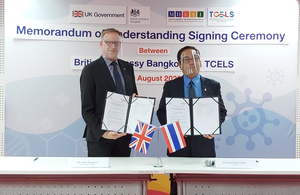The UK and TCELS to jointly support COVID-19 research in Thailand
TCELS and the British Embassy Bangkok to jointly support development of COVID-19 test kits and pandemic surveillance platform in Thailand.

The UK Government, through the British Embassy Bangkok, and the Thailand Center of Excellence for Life Sciences (TCELS, under the Ministry of Higher Education, Science, Research and Innovation) have today agreed to share knowledge, technology, experience and business information, and to support the research in health and medicines.
Today (10 August 2020) British Ambassador Brian Davidson and TCELS CEO Dr. Nares Damrongchai signed a memorandum of understanding which states that the two organisations will give financial support via Mahidol-Oxford Tropical Medicine Research Unit (MORU) under the Faculty of Tropical Medicine, Mahidol University to conduct 2 research projects: i) the implementation of RT-LAMP technology and genome evolution analysis for 2019-nCov led by Dr. Thanat Chookajorn; and ii) the development of a spatiotemporal surveillance platform with interactive user interface for real-time evaluation of the COVID-19 epidemic situation in Thailand led by Dr. Chawarat Rotejanaprasert.
The expected outputs of the projects are RT-LAMP emergency test kit for COVID-19 which have been tested and ready for mass production, the RT-LAMP project was supported by the National Research Council of Thailand (NRCT) for the test development phase, and the funding from TCELS and UK Government would be supporting the clinical evaluation of the test kit and the surveillance platform for COVID-19 transmission monitoring that fits for the current situation in Thailand as well as other diseases. The platform will be used to evaluate the disease control policy in real time, building Thailand’s preparedness should there be a new wave of transmission. Both projects will be conducted by researchers from the Faculty of Tropical Medicine, Mahidol University.
The MOU is the first one between the British Embassy Bangkok and TCELS which will lead to further collaborations on genomic studies. This is a significant step that builds on prior medical research collaborations that the UK and Thailand continue to have for many years with an aim to sustainably better the people’s livelihood and bring prosperity to both countries.
Brian Davidson, British Ambassador to Thailand, said:
The United Kingdom has been supporting middle-income countries through our Prosperity Fund Programmes to help them achieve sustainable and inclusive economic development. The Prosperity Fund’s Better Health Programme aims to improve the people’s health through partnership and collaborations with our partner countries. We are excited to be working with TCELS as a part of the global effort to fight against the pandemic that has disrupted the whole world. We hope the two research projects will help Thailand in its response to the coronavirus.
Dr. Nares Damrongchai, CEO of TCELS, said:
TCELS has the mission to support and groom Thailand’s research and innovation that entail health and medical products and services. We aim to build in Thailand the environment, infrastructure and human resources that will enable the international-standard health and medical innovations that are relevant. We also work with our network to ready our business and investment capacities to enter the medical hub industry. One of our approaches is to give financial support to health and medical research projects under TCELS. We would like to thank the UK Government and the British Embassy Bangkok for joining us in supporting important researches that respond to global challenges.
We will continue to work with the UK on the area of health and medical research. The next phase of our collaborations will be about developing the capacities of genetic counselors for medical genomics and precision medicines, for which we hope to be able to announce some good news in the near future.